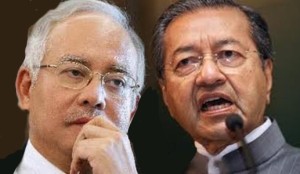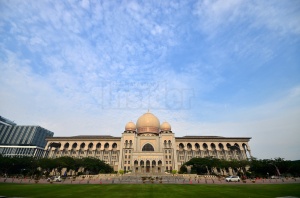by Kim Quek@www.malaysiakini.com
Few would doubt that the outcome of the final appeal of Anwar Ibrahim on October 28 and 29 against his sodomy conviction will be decided by politics, not by law. More specifically, the court’s verdict will likely be determined by UMNO’s political considerations on the impact of such final judgment.
Two main factors will decide Anwar’s fate. The first is UMNO’s answer to this question: Will the jailing of Anwar be a net gain for UMNO’s political survival? The second is the outcome of the competitive influence on the Judiciary between Prime Minister Najib Abdul Razak and the conservative faction led by former Premier Mahathir Mohamad.
Imprisoning Anwar will save UMNO?
Will UMNO be safe after Anwar is put away to prison? It is the popular believe that once Anwar is jailed, the alliance of Pakatan Rakyat will disintegrate. Many in UMNO think that without the cementing factor of Anwar, DAP and PAS will part company due to their ideological differences over mainly religious issues. Such common notion is strengthened by the errant conduct of PAS in the recent Selangor crisis.
However, a closer look into that event will reveal that the trouble created by PAS was mainly caused by PAS President Hadi Awang and the conservative ulama, who seemed bent on going loggerheads with PKR and DAP in the choice of MB for Selangor, despite being opposed by the party’s progressive and pro-Pakatan faction.
Though Hadi had managed to overrule the progressives in that episode, the latter were clearly in the majority in the central committee which is the party’s highest body for political decision making and implementation.
It is plain to all that Hadi’s (left)) extremist and reactionary stance on religion and politics, which has alienated both PKR and DAP and rejected by all non-Muslims and the moderate Muslims, is sheer political suicide for his party. Unless Hadi changes his stance or is removed from power, PAS will be heading for obliteration in coming elections.
For this reason, I think even the conservatives will realise this unpalatable reality, given time and persuasion to chew over the fatal consequences of so decisively alienating such large and important sectors of the electorate; and the progressives who fervently believe and support the common cause of good governance and social justice of Pakatan Rakyat will surely prevail in the current power tussle and gain clear power by the next party election the latest.
When that happens, PAS will emerge stronger, so will Pakatan Rakyat, considering the excellent rapport existing between PAS’s progressive leaders and their counterparts in PKR and DAP.
The torch of Reformasi will be passed on
Anwar’s departure to prison will not leave a vacuum, as the Reformasi ideals are already firmly implanted into the leadership of all the component parties of Pakatan Rakyat. Neither would Anwar’s PKR party suffer a leadership deficit, as its youthful leaders are already groomed to carry on the torch of reforms without Anwar’s physical presence.
If there is any difference, Anwar in prison will only inspire and strengthen their political conviction that, come what come may, they must save the country from the seemingly unending crutches of an evil regime.
To those UMNO hardliners gleefully looking forward to what they think is the political annihilation of Anwar, I advise them to take a trip down memory lane. The last time Anwar was jailed on such sodomy charge in 1998, it caused such a torrential backlash that UMNO, for the only time in history, lost the support of the majority of Malays. And Barisan Nasional (BN) would have been defeated in that 1999 elections, if not for the massive and unprecedented swing of Chinese support to BN.
That swing was a result of BN’s campaign of deception through a blitzkrieg on street violence against Chinese in Jakarta in the aftermath of the toppling of dictator Suharto, Mahathir’s constant warning of a May 13 style racial riot and the concocted imminence of an Islamic state under PAS.
Fifteen years on, the political scenario has much changed. The sound and fury of the Malay masses that greeted the previous sodomy trial of Anwar is no more found in the current trial. But, equally if not more important, is the virtual permanent alienation of Chinese electoral support for BN.
Taking the 2013 election as benchmark, where Pakatan’s 52 percent share of the popular votes is estimated to comprise 40 percent of Malays and 75-80 percent Chinese, and there were dozens of seats lost to BN on thin margins, BN can ill afford to lose even a small swath of Malay votes, keeping in mind that the massive swing of Chinese support to Pakatan in the last two general elections in 2013 and 2008 is virtually irreversible.
Is UMNO so sure that the second-time jailing of Anwar on sodomy will not incur a backlash among Malays, though understandably less sweeping than the previous occasion? The rapid advance of the social media has made our people much better informed now. If UMNO couldn’t hide the injustice against Anwar fifteen years ago, it is even less able to do the same this time.
Take it that the majority know what is going on, and it is certainly not to the credit of Najib’s leadership and government to so savagely maul Anwar yet again, with a trial which is manifestly void of merits in fact and in law. Keeping silent does not mean ignorance or approval. Beneath the calm on the surface, hazardous undercurrents could be running that may cause fatal consequences to the perpetrators of such injustice. UMNO is hence advised to look before it leaps.
Mahathir vs Najib
The other main factor that may impact the court verdict is the current power tussle between Najib and Mahathir. For Mahathir, it is a relatively simple decision. Eliminate what is to him UMNO’s enemy No1 would safeguard UMNO’s hegemony, as well as dodging the day of reckoning for him personally if Anwar were to become the prime minister.
Besides, with Anwar removed from the scene, Mahathir would feel free to unleash his fury to unseat Najib without the worry of the dreaded Anwar to take advantage of UMNO’s open rift. However, Najib may have quite a different view. Knowing that Mahathir sees Anwar as his most-feared enemy, the continued presence of Anwar in the political arena may serve as a counterweight to Mahathir’s reactionary influence to restrain him from all-out attacks against Najib’s premiership.
Another important consideration for Najib is his concern for his international image. For years, he has been painstakingly cultivating his image as a moderate leader in the international stage (at great costs to the public of course) and even launched his pet Global Movement of Moderates to buttress such credentials.
Now, what will the world make of Najib, if an internationally respected leader like Anwar is sent to prison in a notorious trial that has already been universally condemned as a great travesty of justice, transgression of human rights and democracy? Where would Najib and his wife Rosmah (more so the latter) hide their faces at distinguished international gatherings during their frequent overseas trips?
Hence, it is not entirely impossible that Najib would prefer to see Anwar freed, or perhaps, as a compromise to UMNO’s hardliners, penalised with a fine that would bar him from election or appointment to party post for many years to come.
To sum up, Anwar’s fate at his final appeal hinges on the outcome of cross currents of UMNO’s party interests and conflicting personal interests of feuding leaders.
Will the Federal Court rule according to law?
Perhaps at this point, questions may be asked about our judges, whether they may exercise their judicial judgment strictly according to law and constitution, free of political influences. This is unlikely to happen, as the record of recent years has shown that the Federal Court has ruled in favour of the powers that be in every case where vital interest of the latter is at stake, irrespective of whether the judgment is in conformity with the constitution and law. Such pattern of judgment was most glaringly demonstrated in the series of Federal Court decisions where the constitution was thrown to the wind to ensure BN succeeded in it’s power grab in Perak.
Having said that, miracles do happen. Who knows the majority of judges may at the end decide to allow their judicial conscience to overrule their personal political loyalty or political bidding of others.






No comments:
Post a Comment
Note: Only a member of this blog may post a comment.